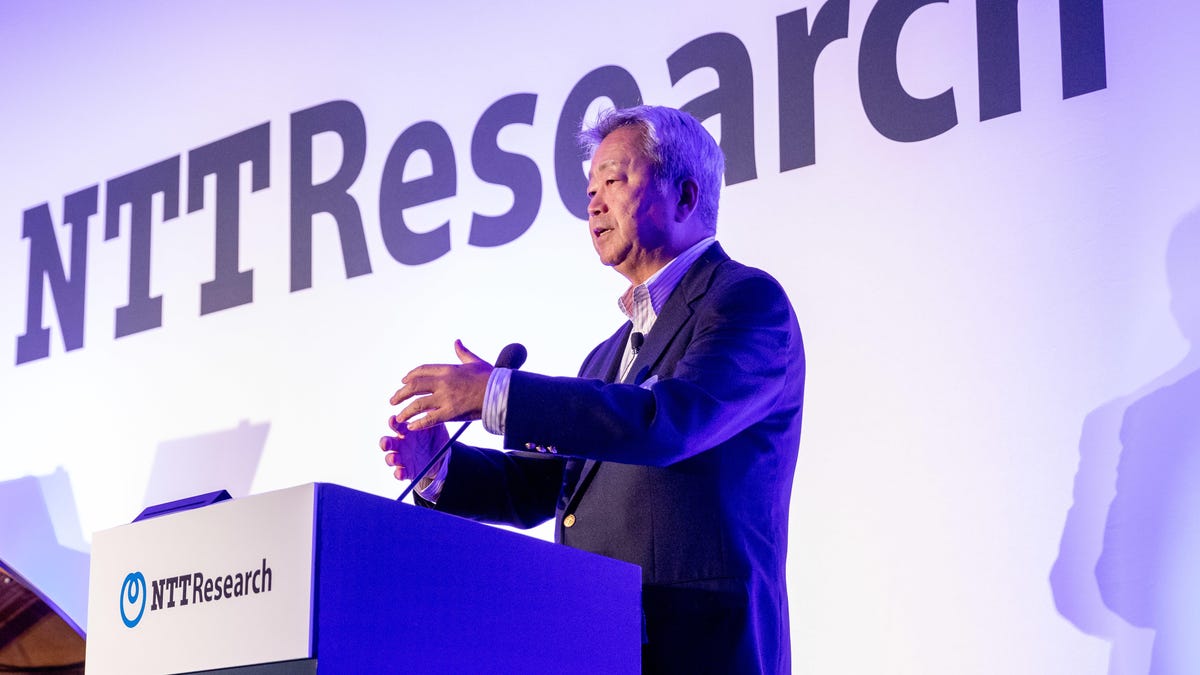Japanese telco giant plants research lab flag in Silicon Valley
NTT researchers will pursue cryptography, quantum computing and medicine.

NTT CEO Jun Sawada speaks at the launch of NTT Research in Silicon Valley.
Some of the computing industry's biggest innovations have come from research labs. The transistor was created at AT&T's Bell Labs, the hard drive by IBM Research and the graphical user interface at Xerox's PARC.
NTT, one of Japan's telecommunications giants, wants similar success. It's already got thousands of researchers in Japan working on projects with near-term potential, but now it's picked Silicon Valley for its first US lab for more the more basic academic research that could pay off with breakthroughs farther in the future.
"This is the place where east meets west on the innovation crossroads," said Kazuhiro Gomi, chief executive of NTT Research, as he unveiled his company's ambition on Tuesday at the swanky Rosewood Sand Hill hotel in Menlo Park, California.
NTT Research has a particular focus on optics for networking and quantum computing.
NTT Research will investigate three areas at the outset: cryptography, including new encryption and blockchain technologies; medicine, including sensors that can create a person's "digital twin" that will warn of actual health problems; and physics and informatics, including an effort to build a new type of fiber optic-based quantum computers.
Research labs are something of a luxury item in the computing industry. As tech startups mature into tech titans, they often hire academic-minded scientists and engineers to blaze trails beyond next year's product roadmaps. It's almost a rite of passage for tech companies to launch research operations. Microsoft, Google and Facebook all have.
NTT's name isn't well known outside of Japan, but the company is a significant force in the tech world. It's got 300,000 employees, operates in 88 countries and pulls in annual revenue of $107 billion with businesses like computing services for corporate customers.
At the NTT Research opening event, hundreds donned dark suits to hear speeches from CEO Jun Sawada, Gomi and a handful of researchers. Classical violinist Ryu Goto also performed, a sharp contrast to the peppy, thumping pop music you'll hear at most tech shows. The event took place just up the street from Stanford University and venture capital powerhouses like Kleiner Perkins Caufield & Byers, Greylock Partners, Andreessen Horowitz, Khosla Ventures and Draper Fisher Jurvetson. NTT Research plans further outposts in other intellectual capitals, including Boston, Munich, Israel and London.
Cryptography and quantum computing
NTT Research will collaborate with university experts. One is Brent Waters, a cryptography expert at the University of Texas, Austin, who now holds the title of distinguished scientist at NTT Research, too.
Waters wants to pursue attribute-based encryption, a process in which data is encrypted so that people with certain roles can decrypt it, not just specific individuals. That could be useful for circulating information among a restricted group of authorized people.
Another is functional encryption, which lets computers process encrypted data without ever being able to tell what's actually in that data. That could be useful something like for letting Google screen spam out of your Gmail inbox without actually reading your email.
NTT's LASOLV computer is designed to tackle computing challenges using the interaction of light waves.
NTT Research also has a fondness for photons. Today's industry uses light for long-distance communications in fiber-optic lines, but NTT sees a broader role, replacing today's metal wiring and radio-wave wireless networks with optical networks that have vastly more capacity.
Photons also factor into another major focus, quantum computing. While some quantum computing efforts focus on qubits housed on quantum processors, NTT Research hopes to use a different processing approach, the interactions of light traveling in fiber-optic lines.
Telephones and telegraphs
The new NTT Research only has about 20 staff so far, but should expand to at least 50 during the next five years, said Kei Karasawa, the vice president of corporate strategy who's overseeing the lab's direction and hiring some of its brains.
Why launch in Silicon Valley? Mostly because that's where top researchers want to be, Karasawa said. Indeed, many of them have worked at Stanford or the University of California at Berkeley on the other side of the San Francisco Bay. The area also has a fertile cooperation with private sector companies.
The company already has about 6,000 researchers. With NTT Research, though, the plan is to steer the company in a more academic direction closer to the research frontier, Karasawa said.
NTT is short for Nippon Telephone and Telegraph, two once-revolutionary communication technologies that are now mostly history. When Sawada joined 40 years ago, 90% of the company's revenue was from telephone service; now, including mobile telephony, it's 18%.
"We want to change along with circumstances," Sawada said.

